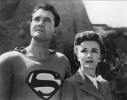The cliche isn't the bad part to me, it's the laziness of writers putting the loved ones in trouble time and time again as an easy story.
I agree with that--to an extent. In a more realistic scenario, the hero's loved ones would not be in danger until someone learned the hero's identity. Also, the family and friends would not be a part of the hero's super life. There's the rub. How do you have a cast of interesting supporting characters who are not part of the hero's superhero life as well?


 ), but please, if she's your fave, grant her the dignity of spelling her name right. It's Noel Neill.
), but please, if she's your fave, grant her the dignity of spelling her name right. It's Noel Neill.
 I love Coates. I love George Reeves. I love Adventures of Superman and Superman and the Mole-Men. Have I redeemed myself yet?
I love Coates. I love George Reeves. I love Adventures of Superman and Superman and the Mole-Men. Have I redeemed myself yet?